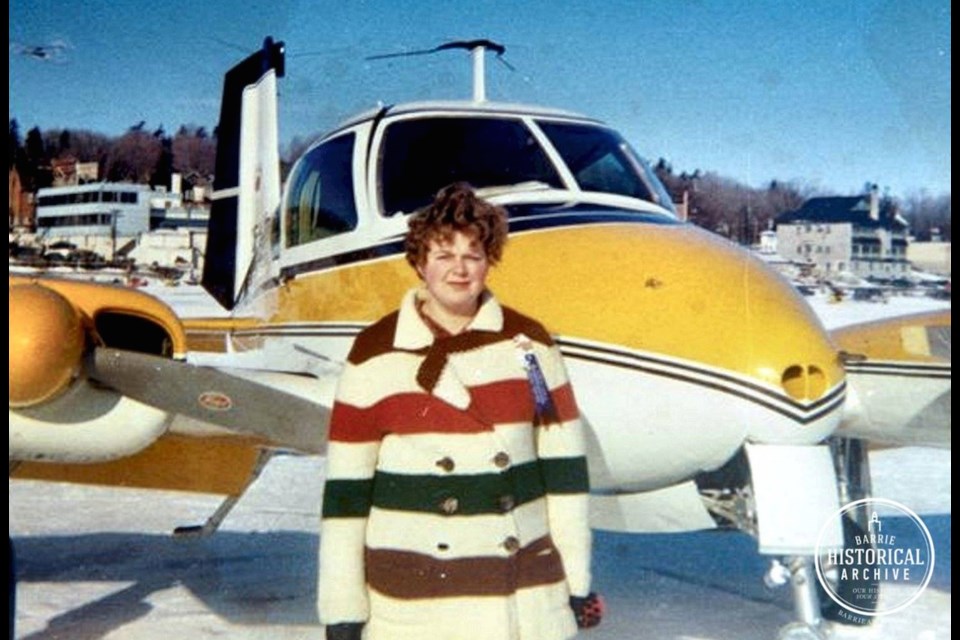Nearly five years ago, one of my favourite school teachers passed away at Victoria Village at the age of 103. Her own early education occurred during the Great War years in a small Scottish village. A recollection of hers, from that time, has always stuck with me.
Rena vividly recalled the day when an unfamiliar droning sound was heard outside the school house. The teacher suddenly realized what it was that they were hearing and quickly sent her pupils outside for a look. An aeroplane! Neither the children nor their instructor had likely ever seen such a thing before – what an interesting and pivotal moment in time it must have been!
Afterwards, the students were asked to write a short essay on what they thought the pilot might be thinking and doing way up there in his flying machine.
In 1903, the Wright brothers had famously made their first successful aeroplane flight which is defined as a “controlled, powered sustained flight of a heavier-than-air machine.” As with the bicycle and the automobile, most observers considered the aeroplane to be somewhere between science fiction and a passing fad. It would never catch on.
Early on, little appeared in any newspapers about the trial flights and experiments led by Orville and Wilbur Wright at Kill Devil Hills in North Carolina. Reporters had grown tired of watching endless trials and failures, and simply stopped covering the antics. Any word of successes was met with extreme skepticism – man will never fly!
But fly they did. During the next decade, daredevils, eccentric millionaires and assorted adrenaline junkies bought or built planes and took to the skies. Each one tried to push the limits of the previous flyer – a jaunt across the English Channel, a buzz over the Eiffel Tower, or a night landing.
These early machines very often caused the death of their operator. A dark joke at the time suggested that if a valued employee purchased an aeroplane, the business would be wise to start advertising for a replacement as there was very likely to be a vacancy soon.
The people of Barrie quite possibly had their first up close aeroplane experience in 1913. That year was the town’s Diamond Jubilee, a celebration of the community’s 60th anniversary, and the organizers wanted something extra special as an attraction.
“Any Barrieites want to go up in an aeroplane?” so asked the title of the short column in the April 24 edition of the Northern Advance.
The celebration committee had booked the American duo Captain Thomas Baldwin and Cecil Peoli to thrill the citizens of Barrie with their flying machine display and had, in fact, arranged for local people to enter a draw for a chance to win a ride in one of the planes, if they dared.
“If there are any reputable citizens of Barrie who wish to take their first journey in an aeroplane – to taste the thrills and excitements which accompany a flight into the clouds on a heavier-than-air machine – their opportunity has arrived or will arrive.”
Whatever transpired, either a complete lack of entries or a liability roadblock, all mention of the contest disappeared from the local papers before the Jubilee. Neither would be surprising as very little was considered more dangerous at the time, than flying in an aeroplane!
The crowds, estimated at perhaps 25,000 people (well beyond the town population of some 6,000), were well entertained with a large parade, an old boys reunion, a torchlight military tattoo, food, fire works, music and, of course, the aviation spectacles held on both days.
Captain Baldwin was known all over North America as a character larger than life. He started his working life as brakeman for an Illinois railway, but ran away to join a circus and became an acrobat. By the mid 1870s, Baldwin was performing acrobatic stunts in a hot air balloon. He went on to invent powered hot air balloons, a dirigible, and finally an aeroplane known as the Red Devil.
In 1912, Baldwin met a young model aeroplane builder, Cecil Peoli. He saw something special in the teen and taught him to fly his Red Devil making Peoli, at 17, the youngest person to be granted an aeroplane pilot’s license. Peoli was soon performing daring feats and appearing in the newspapers everywhere. His name was already quite familiar to his audience when he arrived at the old Agricultural Park in Barrie that summer.
“The most thrilling, sensational and thoroughly enjoyable attraction ever staged in Barrie was the aviation exhibitions of Monsieur Cecil Peoli, the 19-year-old protégé of Captain Baldwin,” gushed the Northern Advance on July 3.
“Monsieur Peoli, in the most unassuming manner, took off his coat and, donning an oilskin jacket, stepped into his seat after starting the propeller. Facing a strong wind, he steered westerly, then circling back he sailed over the town, reaching an altitude of 2,000 feet. When he had performed many startling evolutions, he gradually descended until he was about 1,200 feet above the earth when he shut off his engine. Then came the thrilling sensation of flying through the air at 75 miles per hour, taking a slanting course towards the east. Starting his engine again, he circled again and like an immense bird glided to the park.”
One year after his visit to Barrie, Peoli became the first pilot to fly over the Andes Mountains and the first to deliver letters by airmail. One year after that, he designed his own aeroplane and formed the Peoli Airplane Company. Unfortunately, the first test flight of the Peoli designed biplane was its last. In April 1915, the fearless 20-year-old was killed when his plane crashed in Maryland during a trial flight.
Each week, the Barrie Historical Archive provides BarrieToday readers with a glimpse of the city’s past. This unique column features photos and stories from years gone by and is sure to appeal to the historian in each of us.



